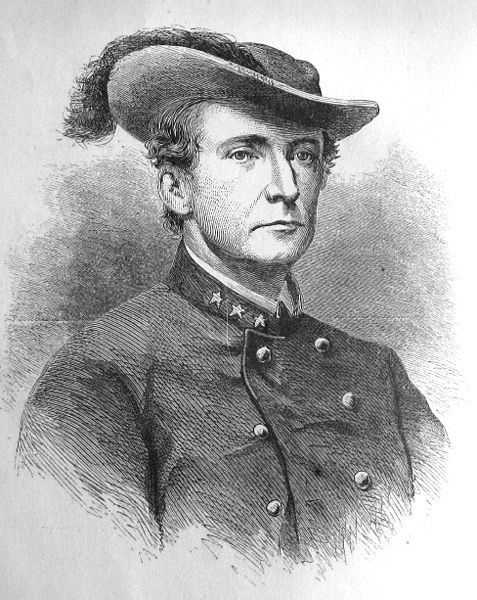The Partisan Ranger Act was passed on April 21, 1862, by the Confederate Congress. It was intended as a stimulus for recruitment of irregulars for service into the Confederate Army during the American Civil War.
The Confederate leadership, like the Union leadership, later opposed the use of unconventional warfare out of fear the lack of discipline among rival guerrilla groups could spiral out of control. On February 17, 1864, the law was repealed after pressure from General Robert E. Lee and other Confederate regulars.
Recruitment broadside for Partisan Rangers
43rd Virginia Cavalry Battalion
The 43rd Virginia Cavalry Battalion, also known as Mosby's Rangers, Mosby's Raiders, or Mosby's Men, was a battalion of partisan cavalry in the Confederate Army during the American Civil War. Noted for their lightning strike raids on Union targets and their ability to consistently elude pursuit, the Rangers disrupted Union communications and supply lines.
Col. John S. Mosby, wood engraving 1867
Sergeant William T. Biedler, 16 years old, of Company C, Mosby's Virginia Cavalry Regiment with flintlock musket. From the Library of Congress Prints and Photographs Division
Private Lucien Love of Co. D, 43rd Virginia Cavalry Battalion
Confederate Cavalry Colonel John S. Mosby and some of his men-Top row (Left to Right): H. Lee Howison, W. Ben Palmer, John W. Puryear, Tom Booker, Alexander G. Babcock, Norman V. Randolph, Frank Rahm Second row: Robert B. Parrot, Thomas Throop, John W. Munson, John S. Mosby, Rat Noel, Charles H. QuarlesThird row: Walter W. Gosden, Henry T. Sinnott, Otho L. Butler, Issac A. Gentry





